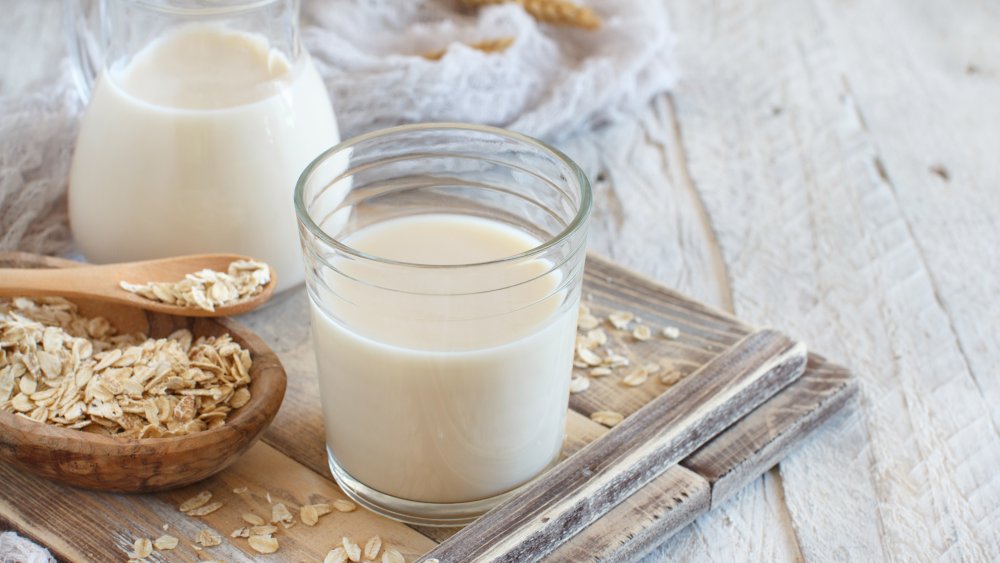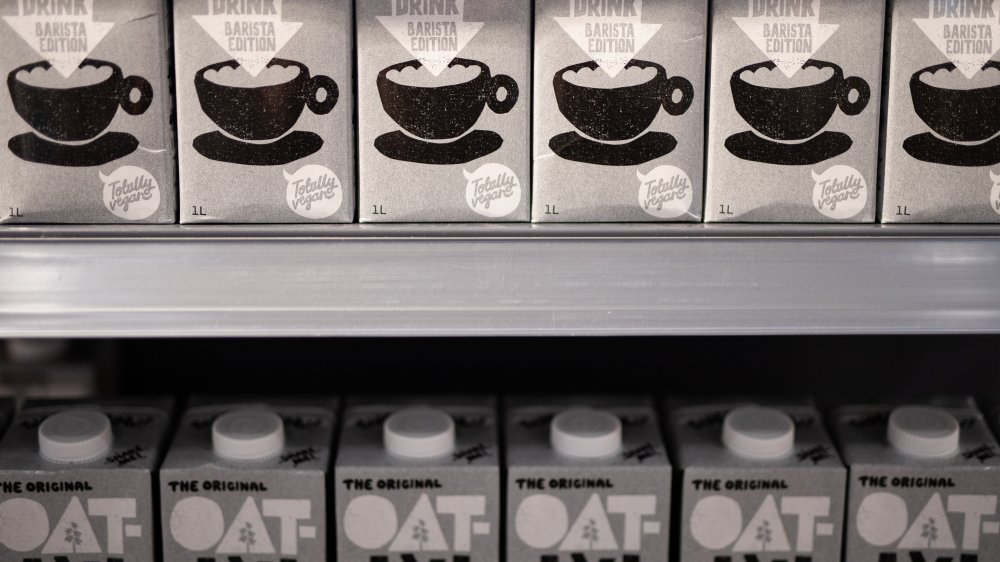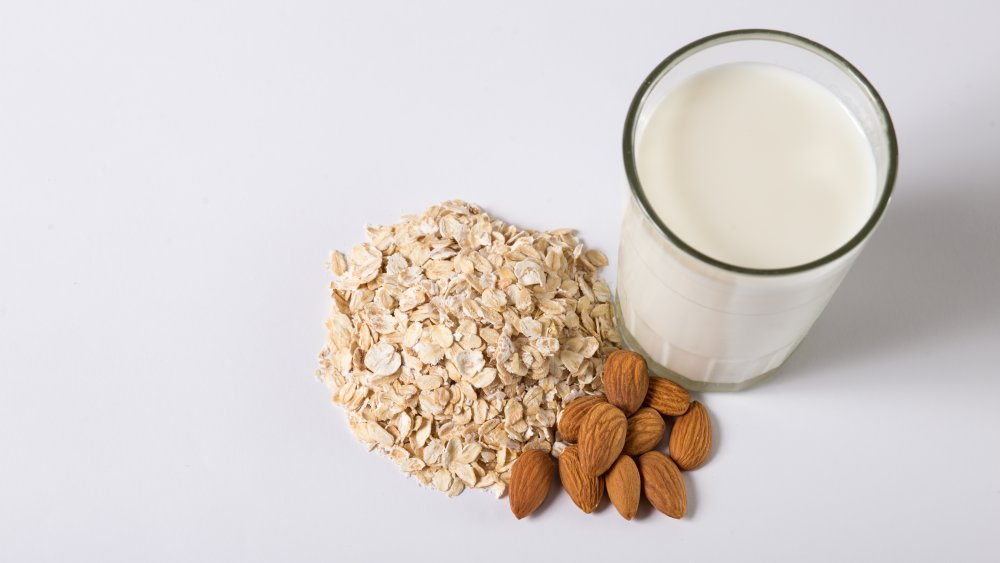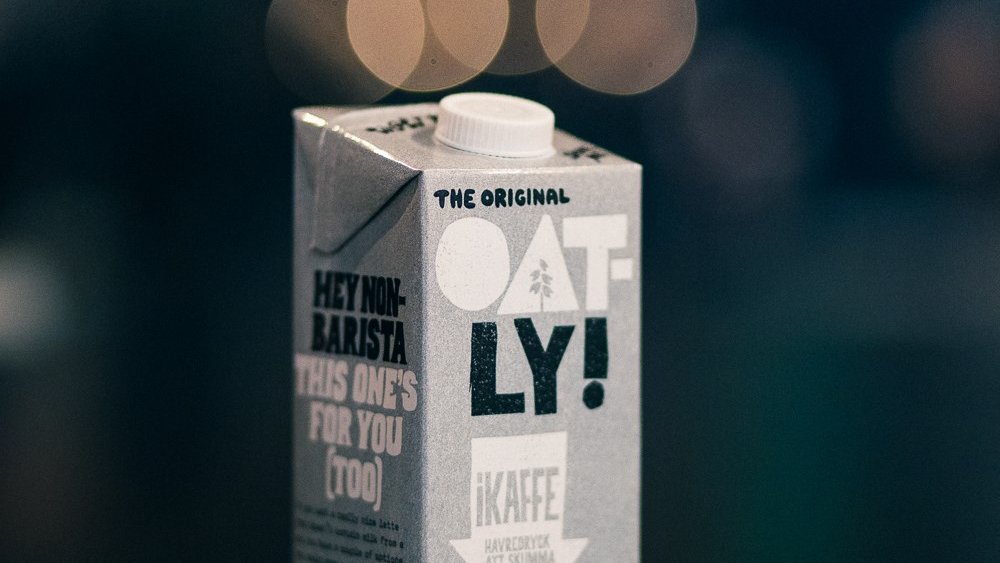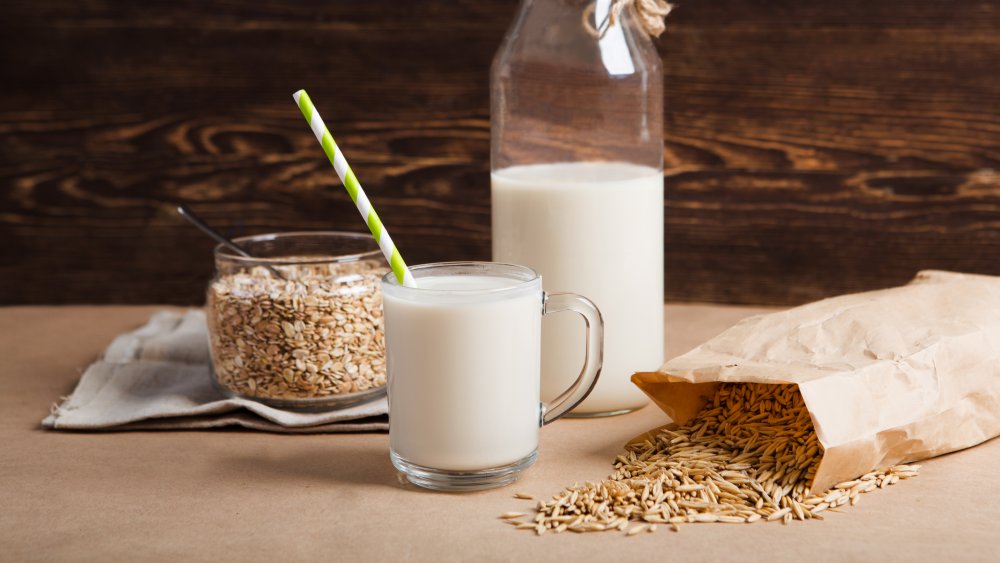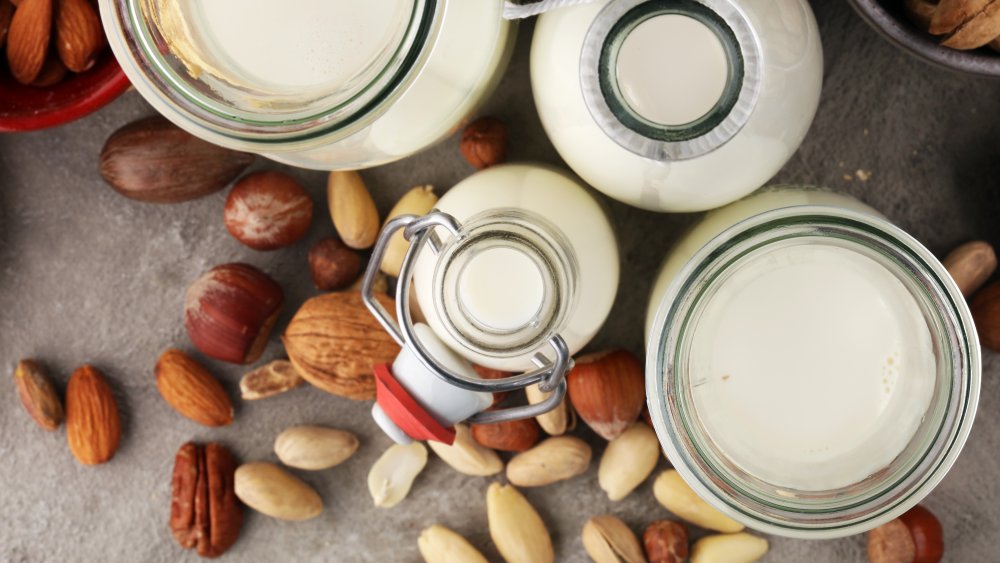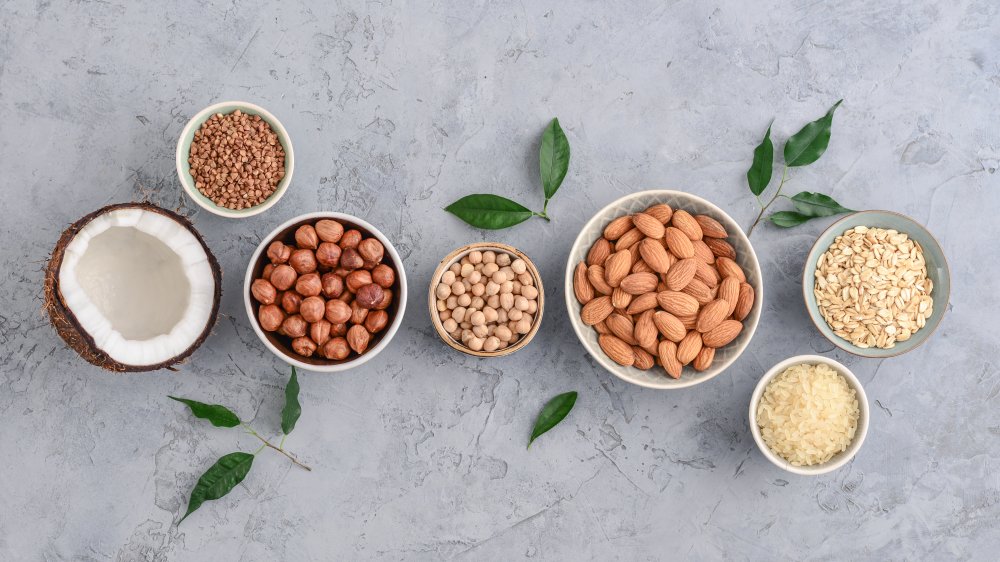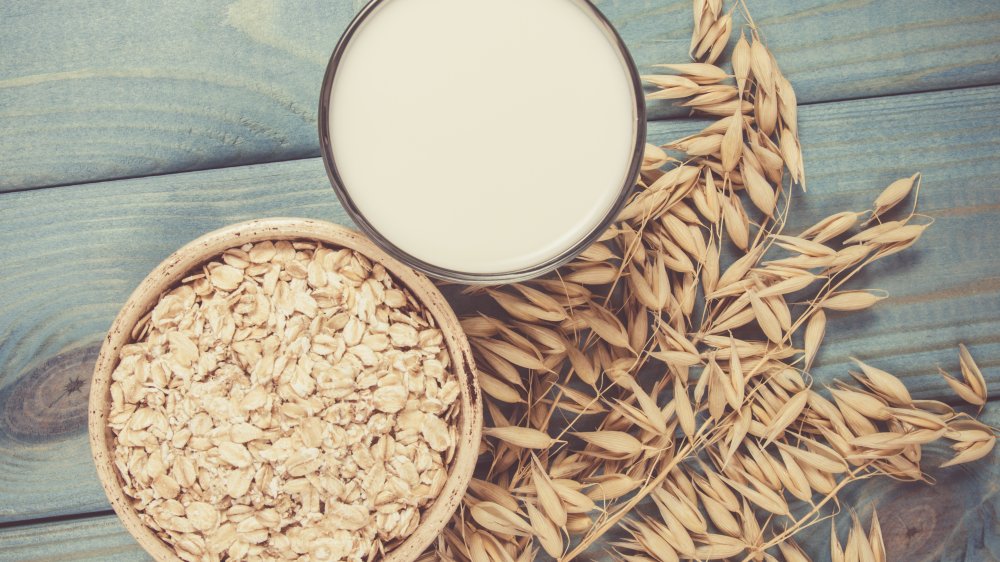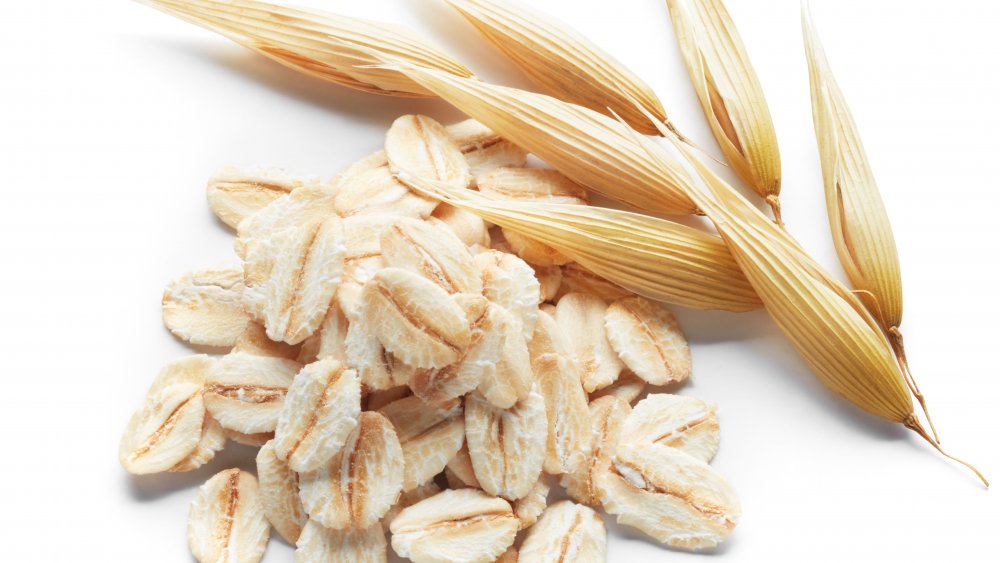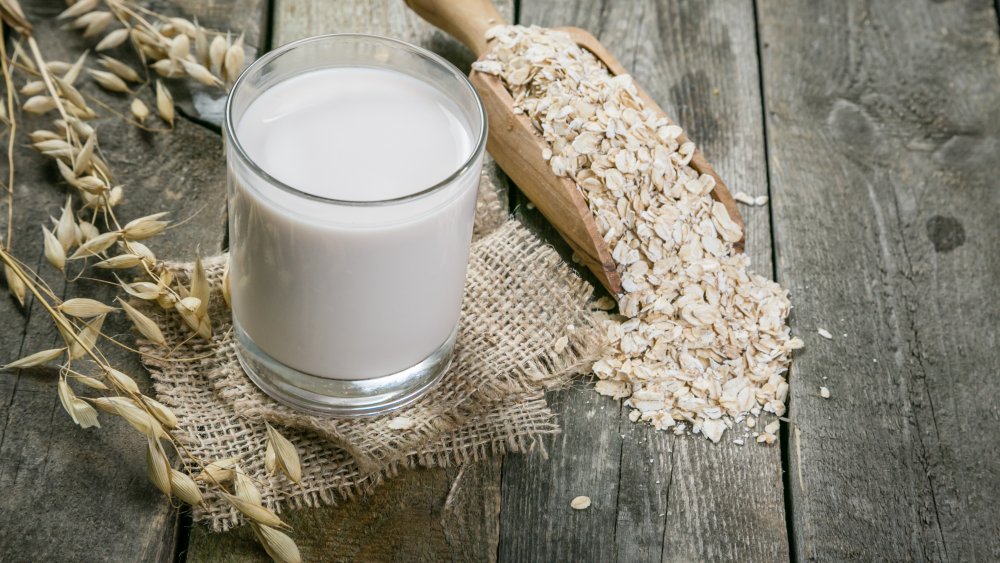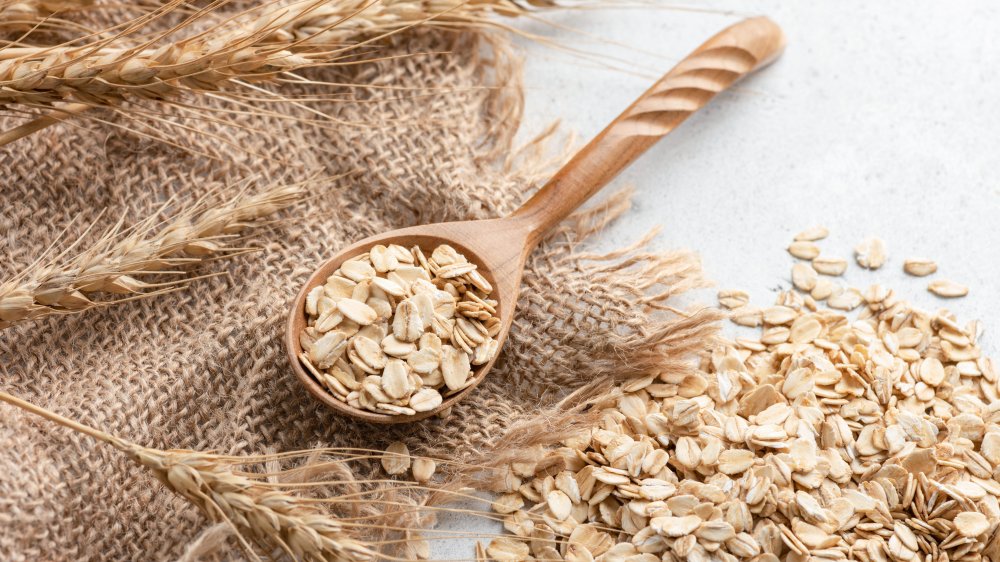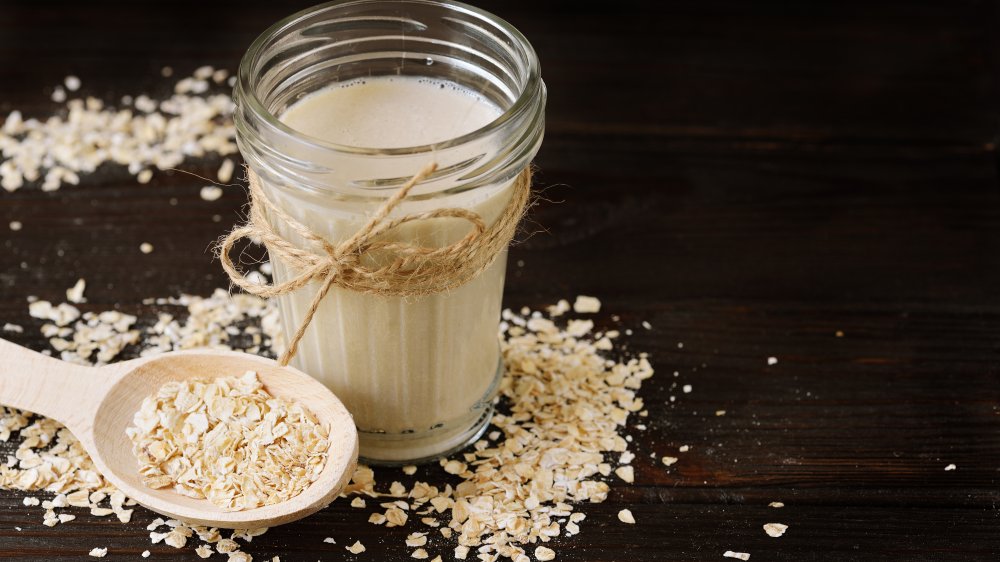The Untold Truth Of Oat Milk
We are currently in the throes of a full force, non-dairy milk revolution.
Not too long ago, soy and almond milk reigned supreme across cafés and grocery store aisles alike; nowadays, the market for alterna-milks has diversified significantly, with obscure options like macadamia, pea, flax, and hemp all sprouting up as creamy plant-based milks that knock the old school soy and almond milks out of the park.
But there's one non-dairy milk that's been making more waves than most: oat milk. Made from, well, oats, oat milk has been in the limelight lately — and for good reason. This milk's sweet and creamy, yet also light and delicate, taste profile is simply unparalleled in its similarity to cow's milk, which makes it the perfect alternative milk for people who can't get enough of their daily dairy fix but want to cut back on the stuff for health or environmental reasons.
Now, if you're new to the non-dairy game, you may be hearing people rant and rave over the oat-based alt-milk and thinking it's all too good to be true, Maybe, maybe not — but it's time to find out. This is the untold truth of oat milk.
Oat milk has been around for longer than you think
If you're at all familiar with oat milk, you probably know one brand in particular: Oatly. They've become especially well known for their interesting and quirky approach to marketing, lining subways, bus stops, and billboards all over the world with clever and somewhat colorful phrases. Oh, and you probably know their oat milk is absolutely delicious.
But what you might not have known is that Oatly's actually been on the market for nearly three decades, according to Time. Rickard Oste, a researcher at Lund University in Sweden, began producing his own oat milk in the '90s, while researching ways to produce milk alternatives for those with a lactose intolerance — he used oats because they're a particularly prominent crop in Sweden.
When he'd gotten the process down to a tee, Öste founded Oatly, selling the milk to a small but devoted crowd of milk-loving Swedes. The company's milk never made its way across the pond until 2016, when it took American markets by storm.
Although Oregon-based Pacific Foods company was the first oat milk producer to come onto the American scene back in 1996, Oatly is certainly to credit for the modern oat milk craze, as Pacific's oat milk never really reached the same levels of popularity as its Swedish counterpart.
Oat milk could dethrone almond milk as the most popular non-dairy milk on the market
Oat milk's rapid increase in popularity could be bad news for another non-dairy milk: almond milk. When it was first introduced to mainstream markets, almond milk quickly knocked soy milk from its position as the plant-based milk on top. Almond milk has remained the most popular non-dairy milk in the game, with almond milk sales reaching more than $1 billion back in 2018, according to Nielsen.
However, almond milk could be in trouble. For starters, it's gotten a lot of flack recently for not being environmentally sustainable. Plus, the diversification of the non-dairy milk industry as a whole could present a potential threat to the nutty dairy alternative, which has already been criticized by many as less satisfying than the new kids on the block. But oat milk could be the vegan milk that dethrones almond: according to Bloomberg Businessweek, oat milk sales jumped up from a mere $4.4 million in 2017 to $29 million in 2019.
While it's a far cry from almond milk's $1 billion, it's worth noting that most of the world's oats are used to produce animal feed, meaning that the oat milk industry has plenty of room to expand; speaking with The Guardian, Liz Specht, the associate director of science and technology at the Good Food Institute said "There's a huge existing acreage that we can safely steal share from without moving the needle at all on total production."
There was a huge oat milk shortage when Oatly first hit U.S. markets
Oatly's first forays into the U.S. market were wildly successful — so much so, that they struggled to keep up with America's newfound appetite for their plant-based milk.
A couple years after the brand developed a "cult-following among hipsters, vegans, and lactose-intolerants alike," as Fox News reported in December 2018, Oatly ran into a bit of a problem: they were all out of oat milk. There just wasn't enough supply for America's ravenous demands.
At the time, Oatly's production of oat milk was pretty much all done in Europe, meaning that the oat milk had to be imported all the way over to the States, which slowed down the process of getting cartons of Oatly out from the factories and into American grocery stores. Not to mention the fact that the process to make oat milk can't be rushed.
According to Delish, the company was working on building its first factory on American soil at the time of the shortage; the facility opened up in the spring of 2019 and the shortage ended thereafter.
But in the meantime, Americans who absolutely needed their daily dose of oat milk took to Amazon, where vendors were listing cartons for upwards of $200. After the U.S. facility's opening, Americans have been pretty lucky — we haven't seen an oat milk shortage of that scale ever since.
You can easily make oat milk at home
While Oatly and other popular oat milk brands use a lot of fancy, scientific processes to make their oat milk as creamy as possible (like emulsifying the milk with canola oil to give it that velvety mouthfeel), you can just as easily make an unprocessed and equally healthy version at home.
All you need is some oats, water, a fine mesh strainer, and a high-speed blender. You'll want to pick up some high-quality rolled oats for this — none of that Quaker Oats instant oatmeal if you want a satisfying and creamy plant-based milk! Simply soak the oats in water overnight (you'll want a 1:4 ratio of oats to water) and then blend until smooth and creamy.
Optionally, you can add sweeteners like coconut nectar or maple syrup to really boost the flavor profile and make it resemble the store-bought version. After blending everything together, simply pour it through a strainer to remove any sediment from your oat milk, and enjoy this high-fiber and easy to make non-dairy milk!
You may find that the homemade oat milk tastes a bit different from the cartons of oat milk you pick up at the grocery store. That's largely because oat milk companies process their milks with enzymes, oils, and other additives that give it its characteristically creamy flavor. So if you're looking for an unprocessed and healthier alternative, making it at home is your best bet.
Oat milk is lower in protein than other alternative milks
Considering the fact that oats are actually a grain — rather than a protein-packed nut or legume — oat milk tends to have quite a bit less protein than some other milks, like soy milk and pea milk. And when you add cow's milk into the mix, oat milk fails to compete. It does, however, have more protein per serving than many plant-based milks, like almond, cashew, coconut, or rice milk.
According to Buzzfeed News, the average serving of dairy milk has about eight grams of protein. On top of that, cow's milk also contains all nine of the essential amino acids. While protein counts will differ across oat milks based on which brand you're looking at, a one-cup serving of oat milk typically only has about three grams of protein, and doesn't contain a complete amino acid profile.
Soy milk, on the other hand, is pretty much on par with cow's milk, as far as protein and amino acid counts go. If you're looking for a dairy alternative but are also trying to increase your protein intake, it's probably better to stay away from oat milk and stick to soy (or get your protein somewhere else).
Oat milk is a bit high calorie
While you're always going to want to check the nutritional labels of the alternative milks you're buying (since these things can vary widely based on the brand you're selecting), as a general rule of thumb, you should expect oat milk to be a bit on the high calorie side — at least when you compare it to other non-dairy milks. As Buzzfeed reported, a serving of oat milk typically contains about 120 calories — that's about four times as much as the average one-cup serving of almond milk.
Now, this is not too bad when you compare oat milk with the average serving of whole cow's milk, which typically has about 150 calories per serving (skim milk, on the other hand, typically has around 90). If you're cutting dairy out because you want to cut down on your calorie intake, oat milk will only make a marginal difference — if counting calories isn't a big deal for you though, oat milk may be the optimal plant-based milk for you.
Oat milk tends to be higher in carbs than other non-dairy milks
Oat milk is a bit of an anomaly next to the other mainstream plant-based milks like almond and soy milk. This is due to the fact that oats are actually a grain — almond milk and soy milk both have a similar nutritional profile, since they're derived from protein-rich, fatty nuts and legumes.
Oats have a very different composition, and as a result they're much higher in carbohydrates with the average serving of unsweetened oat milk containing around 16 grams of carbohydrates, according to Buzzfeed. Soy milk can have anywhere from 3 to 15 grams per serving, depending on the brand and whether or not it's sweetened, and coves milk usually has 11 to 13 grams.
This is pretty typical of grain-based milks as a whole — another popular non-dairy milk that uses a grain as the main ingredient, unsweetened rice milk, has 0 grams of protein per serving, and around 22 grams of carbohydrates.
Oat milk is the environmentally sustainable alternative
It's no secret: dairy is just not environmentally sustainable. Pretty much every non-dairy milk on the market is better for the environment than cow's milk, as The Guardian reported. Producing dairy emits an unparalleled amount of greenhouse gases — which are largely responsible for global warming — and also takes up more land and water than most non-dairy milks.
But some non-dairy milks are better than others. Almond milk, for example, is a notoriously unsustainable non-dairy milk. About 80 percent of almonds are produced in drought-ridden California — since it takes about 15 gallons of water to produce just 16 almonds in total, almond milk production has the potential to take a heavy toll on the state's environment, according to the UCSF Office of Sustainability.
Already, agricultural regions in the state's San Joaquin Valley are suffering from groundwater depletion, which has resulted in the ground sinking, thanks to the almond industry's liberal use of limited water supplies across the state.
As far as environmentally-friendly choices go, oat milk could be one of the most viable alternatives. According to The Guardian, oats are mostly grown in colder, northern areas like Canada and Scandinavia, so growing large quantities of them doesn't require the same levels of deforestation that many other crops (looking at you, coconut milk) do.
Oat milk is a good source of dietary fiber
It's no wonder oatmeal is such a popular breakfast item: oats are incredibly rich in the dietary fiber that helps our metabolism get flowing in the morning. And as a result, oat milk is also a great source of fiber, according to a report from the Journal of Food Science Technology.
Oats are composed of anywhere from two to nine percent dietary fiber. They even contain a special type of fiber known as beta-glucan, which has been found to have cholesterol-lowering effects, according to an article in Good Housekeeping.
As researchers at the University of Bari Aldo Moro in Italy found in 2017, this unique type of fiber has the potential to not only lower your cholesterol levels, but it can also boost your immune system and repopulate your gut flora.
Beta-glucan also provides the body with prebiotics, which help stimulate your body's already-existing probiotics, ultimately aiding in digestion and ensuring that your body fully absorbs nutrients from all the other healthful foods you're eating.
Oat milk froths up better than other non-dairy milks
Still not sure why Oatly was so popular when it first hit U.S. markets? Go down to the nearest coffee house and order an oat milk latté. You'll quickly see what all the fuss is about: steamed oat milk is pretty much second to none, at least as far as non-dairy milk and coffee pairings go.
Baristas all over the country are becoming oat milk converts, as the milk's neutral flavor profile lends itself well to creamy espresso-based beverages like lattés, mochas, and flat whites. What's more, oat milk froths up really well when you steam it, creating the perfect microfoam for a non-dairy cappuccino, according to Refinery 29.
Since oat milk's protein content is so much lower than other non-dairy milks, baristas have to use a slightly different technique for steaming (since the proteins in the milk are what give steamed milk its characteristic bubbly structure), but once the microfoam is established, steamed oat milk has the perfect, velvety consistency that'll satisfy even the most devoted dairy aficionados.
Not to mention, special barista blends for oat milk have been popping up in coffee shops across the country — these versions are specifically formulated so that baristas can easily foam them up without having to switch up their steaming technique too much.
Oat milk could potentially have anti-cancerous properties
Oats just might be able to ward off cancer — beta-glucan, the special fiber that's present in oats, has been shown in a report from the International Journal of Biological Macromolecules to have some cytotoxic effects when introduced to human melanoma cells. This means that beta-glucan actually killed off malignant skin cancer cells.
Now, don't go drinking up glasses of oat milk in the hopes of preventing cancer just yet — as with a lot of other potential cancer treatments, much more research needs to be done before coming to any conclusions about oats and their cancer-fighting potential.
While things are still up for debate as to whether or not oats can be used effectively with cancer treatment, the report noted that beta-glucan derived from oats is more easily digestible than beta-glucan from other sources, like fungi and yeasts, meaning that if beta-glucan does become a mainstream cancer treatment option, oats are likely to be the source from which the fiber is derived.
Still, oats aren't entirely in the clear — many oat farms treat their crops with glyphosate, a pesticide that may have links to cancer. For the record, Oatly has stated that they do not use oats treated with the weed-killer, so it's probably safest to stick to their milk if you're at all concerned about the effects of glyphosate.
Many brands of oat milk are gluten-free
Those with celiac disease or just a simple gluten intolerance will likely be wondering if oat milk is the right dairy alternative for them — after all, a lot of grain-based products contain gluten which is obviously no bueno. But luckily, oats are naturally gluten-free.
However, things get a little bit dicier when you actually explore the way that oats are processed. As The Kitchn reported in 2011, oats are frequently processed in the same facilities as barley, wheat and rye, which do contain gluten — as a result, oats are often contaminated with small traces of gluten, even if they don't contain gluten themselves.
As with many other non-dairy milks (even some soy milks have been found to contain gluten!), it's important for gluten-sensitive individuals to check whether the brand and flavor of oat milk they're purchasing is certified as gluten-free. If you're in the U.S., you're in luck: several oat milks available in the U.S. are gluten-free or have gluten-free options. Just make sure to read the label.
